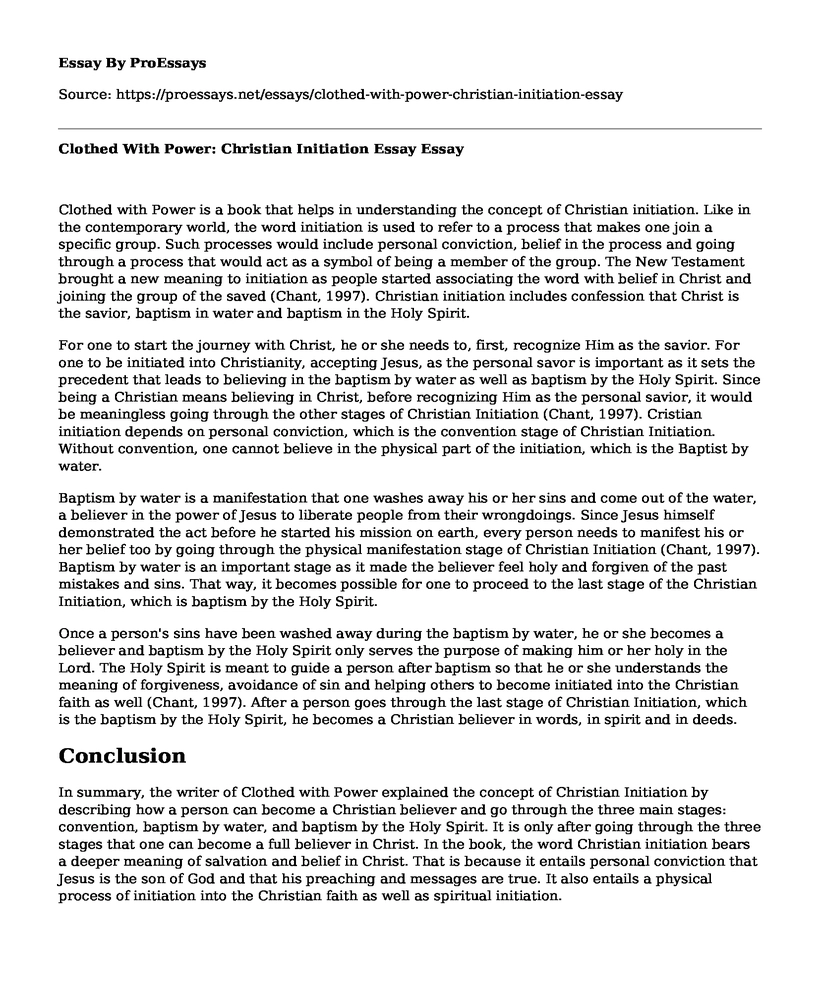Clothed with Power is a book that helps in understanding the concept of Christian initiation. Like in the contemporary world, the word initiation is used to refer to a process that makes one join a specific group. Such processes would include personal conviction, belief in the process and going through a process that would act as a symbol of being a member of the group. The New Testament brought a new meaning to initiation as people started associating the word with belief in Christ and joining the group of the saved (Chant, 1997). Christian initiation includes confession that Christ is the savior, baptism in water and baptism in the Holy Spirit.
For one to start the journey with Christ, he or she needs to, first, recognize Him as the savior. For one to be initiated into Christianity, accepting Jesus, as the personal savor is important as it sets the precedent that leads to believing in the baptism by water as well as baptism by the Holy Spirit. Since being a Christian means believing in Christ, before recognizing Him as the personal savior, it would be meaningless going through the other stages of Christian Initiation (Chant, 1997). Cristian initiation depends on personal conviction, which is the convention stage of Christian Initiation. Without convention, one cannot believe in the physical part of the initiation, which is the Baptist by water.
Baptism by water is a manifestation that one washes away his or her sins and come out of the water, a believer in the power of Jesus to liberate people from their wrongdoings. Since Jesus himself demonstrated the act before he started his mission on earth, every person needs to manifest his or her belief too by going through the physical manifestation stage of Christian Initiation (Chant, 1997). Baptism by water is an important stage as it made the believer feel holy and forgiven of the past mistakes and sins. That way, it becomes possible for one to proceed to the last stage of the Christian Initiation, which is baptism by the Holy Spirit.
Once a person's sins have been washed away during the baptism by water, he or she becomes a believer and baptism by the Holy Spirit only serves the purpose of making him or her holy in the Lord. The Holy Spirit is meant to guide a person after baptism so that he or she understands the meaning of forgiveness, avoidance of sin and helping others to become initiated into the Christian faith as well (Chant, 1997). After a person goes through the last stage of Christian Initiation, which is the baptism by the Holy Spirit, he becomes a Christian believer in words, in spirit and in deeds.
Conclusion
In summary, the writer of Clothed with Power explained the concept of Christian Initiation by describing how a person can become a Christian believer and go through the three main stages: convention, baptism by water, and baptism by the Holy Spirit. It is only after going through the three stages that one can become a full believer in Christ. In the book, the word Christian initiation bears a deeper meaning of salvation and belief in Christ. That is because it entails personal conviction that Jesus is the son of God and that his preaching and messages are true. It also entails a physical process of initiation into the Christian faith as well as spiritual initiation.
References
Chant, K. (1997). Clothed with power. Ramona, CA: Vision Pub.
Cite this page
Clothed With Power: Christian Initiation Essay. (2022, Jul 08). Retrieved from https://proessays.net/essays/clothed-with-power-christian-initiation-essay
If you are the original author of this essay and no longer wish to have it published on the ProEssays website, please click below to request its removal:
- Paper Example on Tolerance and Coercion in Islam
- Practicing as a Christian Counselor Paper Example
- Essay on Singapore: Ancient Buddhist Kingdom of Srivijaya's Outpost Since 5th Century AD
- Essay Example on God's Image: Christianity Enhances Society's Morality
- Essay Example on Pentecostalism: Belief in Spirit Baptism & Speaking in Tongues
- Essay Sample on 21st Century Conflicts: God vs. Culture
- Abrahamic Traditions: Monotheism of Judaism, Christianity & Islam - Essay Sample







